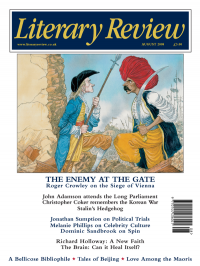Martyn Bedford
Tesla’s Tale
The Invention of Everything Else
By Samantha Hunt
Harvill Secker 358pp £12.99
It’s easy to see why a novelist might be attracted to an inventor – they share an urge to create, along with a compulsion to explore life’s mysteries. Whether Samantha Hunt found such a kindred spirit in Nikola Tesla isn’t clear, but her fascination with this unsung scientific genius is apparent in her retelling, or reinvention, of his life. It is an ambitious conflation of fact and fiction that pays fitting, if warts-and-all, tribute to Tesla (1856-1943), a Croatian-born Serb who pioneered dozens of advances in electricity, radar and telecommunications. He was ahead of his time, scientifically, but his purist approach to the ‘art’ of invention put him at odds with the prevailing mores of capitalism and celebrity in his adoptive America. Profit didn’t interest Tesla, other than as a source of funds for his work, nor was he driven by an egotistical desire for acclaim. To him, the point of invention wasn’t ‘to make things that people want to buy’ but, rather, ‘to improve people’s lives’. Technological innovation ought to glorify science, not the scientist. That was Tesla’s ethos. And much good it did him: he was under-appreciated at the time and neglected by posterity. It didn’t help that he was better at coming up with ideas than applying for patents. Only when it was too late, as a delusional eccentric living out his last days in impoverished obscurity, did Tesla come to resent the likes of Marconi and Edison for claiming the fame, fortune and prizes that were rightly his.
On the face of it, a story set in a bygone age, grounded in meticulous research and with a historical figure as its hero, cuts a stark contrast to Hunt’s highly regarded debut, The Seas, an ethereal tale of the relationship between a traumatised Iraq War veteran and a young

Sign Up to our newsletter
Receive free articles, highlights from the archive, news, details of prizes, and much more.@Lit_Review
Follow Literary Review on Twitter
Twitter Feed
The latest volume of T S Eliot’s letters, covering 1942–44, reveals a constant stream of correspondence. By contrast, his poetic output was negligible.
Robert Crawford ponders if Eliot the poet was beginning to be left behind.
Robert Crawford - Advice to Poets
Robert Crawford: Advice to Poets - The Letters of T S Eliot, Volume 10: 1942–1944 by Valerie Eliot & John Haffenden (edd)
literaryreview.co.uk
What a treat to see CLODIA @Lit_Review this holiday!
"[Boin] has succeeded in embedding Clodia in a much less hostile environment than the one in which she found herself in Ciceronian Rome. She emerges as intelligent, lively, decisive and strong-willed.”
Daisy Dunn - O, Lesbia!
Daisy Dunn: O, Lesbia! - Clodia of Rome: Champion of the Republic by Douglas Boin
literaryreview.co.uk
‘A fascinating mixture of travelogue, micro-history and personal reflection.’
Read the review of @Civil_War_Spain’s Travels Through the Spanish Civil War in @Lit_Review👇
John Foot - Grave Matters
John Foot: Grave Matters - Travels Through the Spanish Civil War by Nick Lloyd; El Generalísimo: Franco – Power...
literaryreview.co.uk